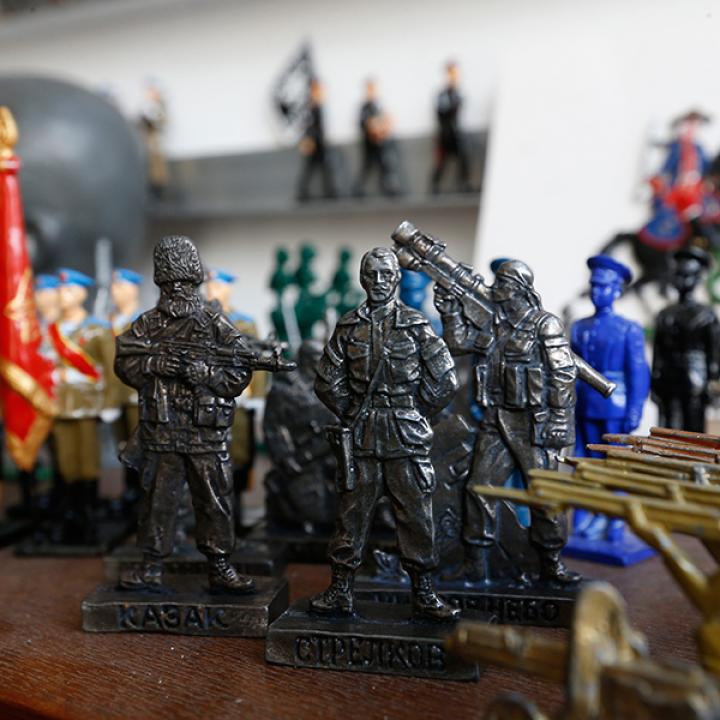
- Policy Analysis
- Articles & Op-Eds
How Putin Checkmated the U.S. in Syria

The Russian leader has achieved most of his goals in Syria at minimal cost, and he will continue to have his way there so long as Washington keeps deferring to him.
September 30 will mark the two year anniversary of Moscow's intervention in Syria that saved President Bashar al-Assad from an imminent collapse. Assad is largely responsible for one of the worst humanitarian tragedies since World War II. Today, in no small part thanks to Russian President Vladimir Putin, he has emerged in the strongest position since massive uprisings swept the country in March 2011.
Iran and its proxy Hezbollah have done much to prop up Assad in the last six years. In late spring of 2013, a Hezbollah surge kept him from falling. But in September 2015 it was Russian airpower that saved Assad from losing ground.
Putin had stood by Assad from the very beginning and protected him in multiple ways. He armed him, protected him on the UN Security Council, and sustained Syria's military and economy. But the intervention was a game changer that signaled Russia's escalation in Syria.
Today, on balance, Putin has achieved virtually everything he wanted in Syria. He kept Assad in power. He entrenched Russia's military presence in Syria for at least the next 49 years -- Russia's largest military presence outside the former Soviet Union at that. Thus, Putin reduced America's ability to maneuver militarily in the region and assured Russia's influence in one of the most strategically important countries in the Middle East.
Putin's support for Assad's ethnic cleansing campaign exacerbated massive and destabilizing refugee flows into Europe. As long as Assad or someone like him remains in power, the majority of refugees will not return home. Assad's traditional foes, such as Turkish President Recep Tayyip Erdogan, have come to accept Moscow's view on Assad, and even Saudi Arabia may be shifting its position in Moscow's favor.
Most importantly for Putin, he can now showcase cooperation with the West -- on his terms. He created a perception of Russia as a great power broker and obtained international recognition for his latest ceasefire initiative in southwest Syria that led to the establishment of de-escalation zones after Putin met with Trump in July of this year. Russia, Iran, and Turkey serve as ceasefire guarantors. Putin always resisted Western-protected safe zones in Syria, but a Russia-led ceasefire allows him to preserve his interests in the country.
De-escalation zones have a weaker protective framework than Western-backed zones would have had. Moscow deployed its military police to monitor the ceasefire but it's unclear how this arrangement will be enforced. The agreement barely acknowledges Iran's role in Syria. Meanwhile, two key US allies in the region, Israel and Jordan, now have to deal with Russia on vital US national security issues. With Russia as a partner, the US now also has to share the moral burden of Russian airstrikes that kill civilians.
Far from getting himself into a quagmire in Syria that President Obama had predicted in October 2015, Putin has been able to carry out a relatively cheap campaign and is now on his way to extricating himself from the conflict while ensuring Russia's presence and influence at the same time. He boosted Russia's arms exports by using Syria as a testing ground for Russian weaponry. Now that the situation is stabilizing in certain key regions of the country, Russian energy companies are looking to rebuild Syria's energy infrastructure.
As the war winds down, Russia's cooperation with Iran shows no sign of abating, and is likely to be the harbinger of broader strategic cooperation with greater implications for US policy in the region. Moscow's and Tehran's mutual interest of opposing the West override their differences.
Putin, who has now been in power longer than Leonid Brezhnev, is gearing up for the presidential election in March 2018. He is eager to demonstrate his success to the Russian public -- and Western failure. Kremlin-controlled press showcased Russia's peace-making efforts and emphasized life returning to normal in parts of Syria. On July 31, Moscow commemorated Russia's Navy Day, and for the first time, the place of celebration included Syria.
It might come as a surprise that during the lowest point in US-Russia relations since the Cold War, new Russian ambassador to Washington Anatoly Antonov, who is on Ukraine-related EU sanctions lists, said after he presented his credentials to President Trump on September 8, "For my part I said that we are looking forward to an improvement in the relations between our two countries." But Moscow wants to present itself as the voice of reason, and point to the West as the cantankerous one. Moreover Russia needs the West -- as both an adversary and a partner. So it seeks to trap the West into cooperation. Too many analysts had believed Putin's announced "withdrawal" from Syria in March 2016 -- an example of taking official statements at face value over reality.
The current ceasefire, however flawed, has held so far. Its future -- along with Russia's -- remains uncertain. But for as long as the West continues to defer to Moscow in Syria, Putin will have a lot to celebrate.
Anna Borshchevskaya is the Ira Weiner Fellow at The Washington Institute.
Forbes



